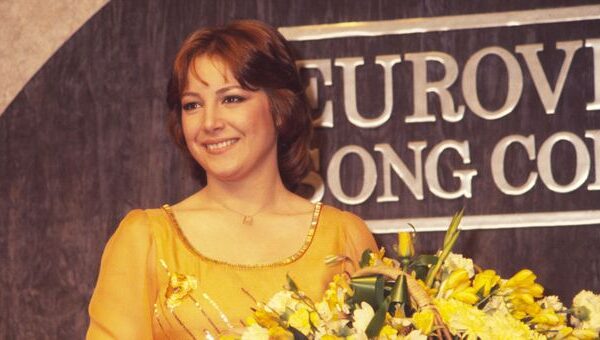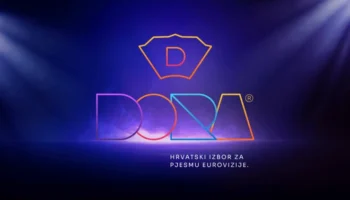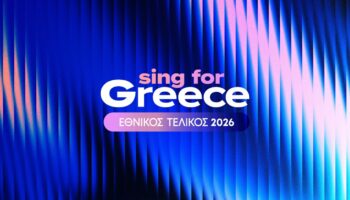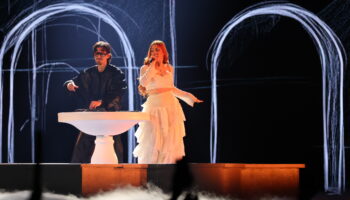In just about three weeks the Eurovision 2026 season will officially open. And while the engines are already well started in Austria and the hosting city for the 70th Eurovision Song Contest shall be revealed next week, this is a good time to take a step aside and have a look at where the contest stand.
Refrain, couleur du ciel, parfum de mes vingt ans. This is the beginning of the first winning entry of Eurovision. It was Lys Assia in Lugano in 1956 with the song Refrain. Born in Switzerland and inspired by Italy’s Sanremo, le Concours Eurovision de la chanson was hence baptisted under the sign of the francophonie. Four out of the seven founding members of the contest had French as a national language (France, Belgium, Switzerland and Luxembourg), and half of the 14 entries of the first edition were sung in this language.
Fast forward more than six decades, it is Saturday 14 May 2022 and the Grand Final of the 66th Eurovision Song Contest goes live from Turin, Italy. 25 songs compete on stage, not a single one is in French. France is represented by a song in Breton, Switzerland and Belgium both sing in English, and Luxembourg is yet come back to the contest. French is then only spoken in the voting procedure or at the beginning of the show when co-host Mika explained the usual voting rules (“vous ne pouvez pas voter pour votre propre pays“).
https://www.youtube.com/watch?v=1HKSP_HQ5hk
The return of Luxembourg
As any French speaker, I was filled with joy to discover the return of the Grand Duchy of Luxembourg to the Eurovision Song Contest in 2024 after an absence of 31 years. Not only was the contest in dire need of new participants, but the Francophonie got back a historic member of the group. The Grand Final of the 2025 Eurovision Song Contest had five entries (at least partially) in French: Luxembourg, Israel, the Netherlands, Switzerland and France. So far so good, but taking into account that Switzerland and Belgium have not been consistent in using their national language on the Eurovision stage, we might need to rely on either France or Luxembourg to do so in the future.
https://www.youtube.com/watch?v=TCWH3Nq5y9A
37 years and counting
French is the second most winning language in Eurovision, with 16,3% of all victories after English (48,5%) and well ahead any other language, but the fifteen French-speaking trophies all belong to a long gone past. The last song in French to win Eurovision was Céline Dion in 1988 with Ne partez pas sans moi, still at a time when the official language rule was imposed. There have been several close calls since, but the trophy never went back to this language. These are the most notable placements:
2nd place
- 2025, Israel – Yuval Raphal – New day will rise (some verses in French)
- 2021, France – Barbara Pravi – Voilà
- 1991, France – Amina – C’est le dernier qui a parlé qui a raison
- 1990, France – Joëlle Ursull – Black and white blues
3rd place
- 2021, Switzerland – Gjon’s Tears – Tout l’univers
- 1993, Switzerland – Annie Cotton – Moi tout simplement
https://www.youtube.com/watch?v=VXLWfXmlXPc
So what next?
So what next for the French language in the contest? The mandatory language rule may be considered scrapped for the foreseable future, but this has not prevented a strong comeback of a linguistic diversity, especially thanks to several victories and good placements of languages other than English. But do French-speaking countries trust themselves?
If we look at the statistics since 1999, France is the flag bearer having always sung at least partially in French with the exception of 2011 (Corsican) and 2022 (Breton). Switzerland has brought five songs in French (2002, 2010, 2020, 2021 and 2025), but has also gone twice with Italian (2000 and 2008).
Belgium only brought French twice: in 2002 with Nathalie Sorce (Envie de vivre) and in 2005 with Nuno Resende (Le grand soir). However, next year it is the turn of the French-speaking broadcaster RTBF to select the Belgian entry, so hopes are high. At the same time the last French speaking participating broadcaster in Eurovision has a perfect score since their comeback. Luxembourg has competed (at least partially) in French in both 2024 and 2025.
A French-speaking block?
To sum it up: the first criterion for a French-speaking song to win Eurovision again is to be presented in the contest. For this we should rely on any of the currently participating French-speaking countries (looking at you, Monaco!), as songs in French from anywhere in Europe are only sporadic. The second criterion to win is to receive enough points, and for this we turn to the voting tables. Does a French-speaking block exist in Eurovision?
Let’s have a look at the points given among the four French-speaking participating countries in 2024:
Belgium (not qualified to the final) Jury: 12 to France and 10 to Switzerland. Televote: 10 to France, 6 to Switzerland and 1 to Luxembourg.
France Jury: 7 to Luxembourg and 5 to Switzerland. Televote: 6 to Switzerland and 3 to Luxembourg.
Luxembourg Jury: 12 to Switzerland, 10 to France. Televote: 8 to France and 2 to Switzerland.
Switzerland Jury: 5 to France. Televote: 7 to France.
And in 2025:
Belgium (not qualified to the final) Jury: 8 to Switzerland. Televote: 8 to France.
France Jury: 2 to France. Televote: 1 to Luxembourg.
Luxembourg Jury: 12 to France and 8 to Switzerland. Televote: 6 to France.
Switzerland Jury: 8 to France. Televote: 4 to France.
If a voting block does exist, this is rather limited to the juries, and yet it is not robust. A reason for the almost non-existent televote block-voting is that in both Belgium and Switzerland, French speakers are a minority and this could be reflected in their televote patterns. I always remind myself of the victory of Céline Dion in 1988 when only the juries could vote. Switzerland received points from 18 out of the other 20 participating countries. Austria and Denmark gave 0 points, while the least amount of points came from France (1), Luxembourg (1) and Belgium (4).
The future of French in the contest
A victory of the French language lacks since 37 years, but for some countries it is even longer. Switzerland won last year. Belgium has not won Eurovision in 39 years (1986), Luxembourg in 42 (1983) and France in astonishing 48 years. We have to go back to 1977 to find the last French victory with Marie Myriam‘s L’oiseau et l’enfant.
It is no secret that France Télévisions has been vying the crystal trophy for quite some time. The recent good placements of Slimane and Barbara Pravi are a testimony of their efforts. Furthermore, rumours have it that the Grand Duchy of Luxembourg also wants its hands soon back on the trophy despite the absence of a suitable venue in the country. And for Belgium, the continuos linguistic fight between RTBF and VRT is a challenge not only to a possible victory but especially to the subsequent hosting in the Low Countries.
Regardless of the country to win with a French speaking entry, the lack of success of the historic noble language of the Concours eurovision de la chanson should soon come to an end. Will 2026 already be the year?




